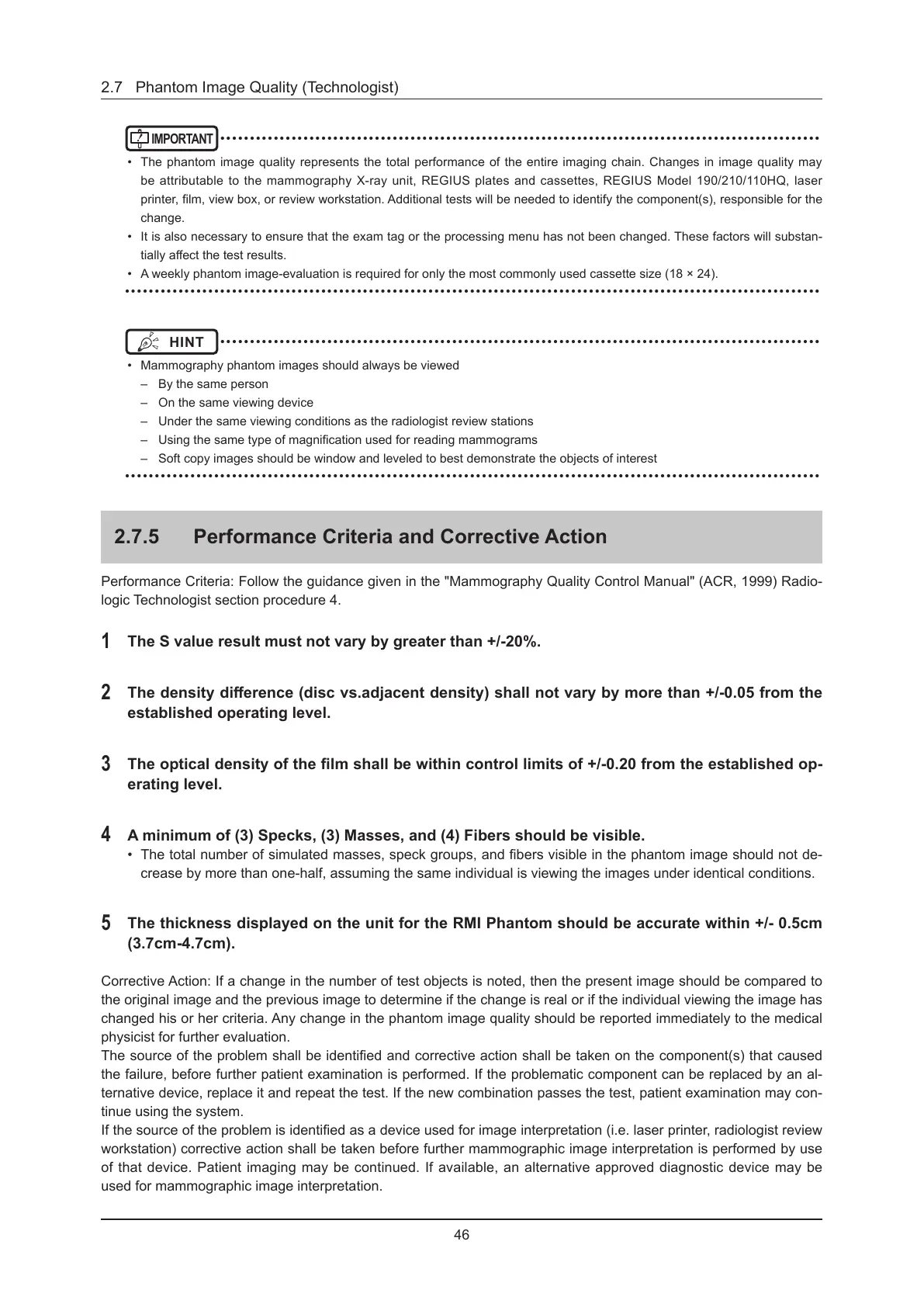46
2.7 Phantom Image Quality (Technologist)
IMPORTANT
•••••••••••••••••••••••••••••••••••••••••••••••••••••••••••••••••••••••••••••••••••••••••••••••••••••
• The phantom image quality represents the total performance of the entire imaging chain. Changes in image quality may
be attributable to the mammography X-ray unit, REGIUS plates and cassettes, REGIUS Model 190/210/110HQ, laser
printer, lm, view box, or review workstation. Additional tests will be needed to identify the component(s), responsible for the
change.
• It is also necessary to ensure that the exam tag or the processing menu has not been changed. These factors will substan-
tially aect the test results.
• A weekly phantom image-evaluation is required for only the most commonly used cassette size (18 × 24).
•••••••••••••••••••••••••••••••••••••••••••••••••••••••••••••••••••••••••••••••••••••••••••••••••••••••••••••••••••••
HINT
•••••••••••••••••••••••••••••••••••••••••••••••••••••••••••••••••••••••••••••••••••••••••••••••••••••
• Mammography phantom images should always be viewed
– By the same person
– On the same viewing device
– Under the same viewing conditions as the radiologist review stations
– Using the same type of magnication used for reading mammograms
– Soft copy images should be window and leveled to best demonstrate the objects of interest
•••••••••••••••••••••••••••••••••••••••••••••••••••••••••••••••••••••••••••••••••••••••••••••••••••••••••••••••••••••
2.7.5 Performance Criteria and Corrective Action
Performance Criteria: Follow the guidance given in the "Mammography Quality Control Manual" (ACR, 1999) Radio-
logic Technologist section procedure 4.
1
The S value result must not vary by greater than +/-20%.
2
The density dierence (disc vs.adjacent density) shall not vary by more than +/-0.05 from the
established operating level.
3
The optical density of the lm shall be within control limits of +/-0.20 from the established op-
erating level.
4
A minimum of (3) Specks, (3) Masses, and (4) Fibers should be visible.
• The total number of simulated masses, speck groups, and bers visible in the phantom image should not de-
crease by more than one-half, assuming the same individual is viewing the images under identical conditions.
5
The thickness displayed on the unit for the RMI Phantom should be accurate within +/- 0.5cm
(3.7cm-4.7cm).
Corrective Action: If a change in the number of test objects is noted, then the present image should be compared to
the original image and the previous image to determine if the change is real or if the individual viewing the image has
changed his or her criteria. Any change in the phantom image quality should be reported immediately to the medical
physicist for further evaluation.
The source of the problem shall be identied and corrective action shall be taken on the component(s) that caused
the failure, before further patient examination is performed. If the problematic component can be replaced by an al-
ternative device, replace it and repeat the test. If the new combination passes the test, patient examination may con-
tinue using the system.
If the source of the problem is identied as a device used for image interpretation (i.e. laser printer, radiologist review
workstation) corrective action shall be taken before further mammographic image interpretation is performed by use
of that device. Patient imaging may be continued. If available, an alternative approved diagnostic device may be
used for mammographic image interpretation.

